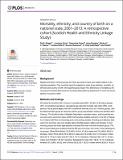Files in this item
Mortality, ethnicity, and country of birth on a national scale, 2001–2013 : a retrospective cohort (Scottish Health and Ethnicity Linkage Study)
Item metadata
| dc.contributor.author | Bhopal, Raj S. | |
| dc.contributor.author | Gruer, Laurence | |
| dc.contributor.author | Cezard, Genevieve | |
| dc.contributor.author | Douglas, Anne | |
| dc.contributor.author | Steiner, Markus F. C. | |
| dc.contributor.author | Millard, Andrew | |
| dc.contributor.author | Buchanan, Duncan | |
| dc.contributor.author | Katikireddi, S. Vittal | |
| dc.contributor.author | Sheikh, Aziz | |
| dc.date.accessioned | 2018-04-24T10:30:17Z | |
| dc.date.available | 2018-04-24T10:30:17Z | |
| dc.date.issued | 2018-03-01 | |
| dc.identifier | 252910630 | |
| dc.identifier | 50a60623-f441-4735-919b-bcb95059d419 | |
| dc.identifier | 85045662806 | |
| dc.identifier.citation | Bhopal , R S , Gruer , L , Cezard , G , Douglas , A , Steiner , M F C , Millard , A , Buchanan , D , Katikireddi , S V & Sheikh , A 2018 , ' Mortality, ethnicity, and country of birth on a national scale, 2001–2013 : a retrospective cohort (Scottish Health and Ethnicity Linkage Study) ' , PLoS Medicine , vol. 15 , no. 3 , e1002515 . https://doi.org/10.1371/journal.pmed.1002515 | en |
| dc.identifier.issn | 1549-1277 | |
| dc.identifier.other | RIS: urn:06AAD979F3ADA46142C6E16D5DE15EA7 | |
| dc.identifier.other | ORCID: /0000-0002-3011-7416/work/60196718 | |
| dc.identifier.uri | https://hdl.handle.net/10023/13192 | |
| dc.description | The authors thank the Chief Scientist’s Office for a grant (CZH/4/878), NHS Health Scotland for a supplementary grant (no number). RSB, LG, DB, AS were the grantholders. SVK acknowledges funding from a NRS Senior Clinical Fellowship (SCAF/15/02), the Medical Research Council (MC_UU_12017/13 & MC_UU_12017/15) and the Scottish Government Chief Scientist Office (SPHSU13 & SPHSU15). AZ is supported by the Farr Institute. | en |
| dc.description.abstract | Background: Migrant and ethnic minority groups are often assumed to have poor health relative to the majority population. Few countries have the capacity to study a key indicator, mortality, by ethnicity and country of birth. We hypothesized at least 10% differences in mortality by ethnic group in Scotland that would not be wholly attenuated by adjustment for socio-economic factors or country of birth. Methods and findings: We linked the Scottish 2001 Census to mortality data (2001–2013) in 4.62 million people (91% of estimated population), calculating age-adjusted mortality rate ratios (RRs; multiplied by 100 as percentages) with 95% confidence intervals (CIs) for 13 ethnic groups, with the White Scottish group as reference (ethnic group classification follows the Scottish 2001 Census). The Scottish Index of Multiple Deprivation, education status, and household tenure were socio-economic status (SES) confounding variables and born in the UK or Republic of Ireland (UK/RoI) an interacting and confounding variable. Smoking and diabetes data were from a primary care sub-sample (about 53,000 people). Males and females in most minority groups had lower age-adjusted mortality RRs than the White Scottish group. The 95% CIs provided good evidence that the RR was more than 10% lower in the following ethnic groups: Other White British (72.3 [95% CI 64.2, 81.3] in males and 75.2 [68.0, 83.2] in females); Other White (80.8 [72.8, 89.8] in males and 76.2 [68.6, 84.7] in females); Indian (62.6 [51.6, 76.0] in males and 60.7 [50.4, 73.1] in females); Pakistani (66.1 [57.4, 76.2] in males and 73.8 [63.7, 85.5] in females); Bangladeshi males (50.7 [32.5, 79.1]); Caribbean females (57.5 [38.5, 85.9]); and Chinese (52.2 [43.7, 62.5] in males and 65.8 [55.3, 78.2] in females). The differences were diminished but not eliminated after adjusting for UK/RoI birth and SES variables. A mortality advantage was evident in all 12 minority groups for those born abroad, but in only 6/12 male groups and 5/12 female groups of those born in the UK/RoI. In the primary care sub-sample, after adjustment for age, UK/RoI born, SES, smoking, and diabetes, the RR was not lower in Indian males (114.7 [95% CI 78.3, 167.9]) and Pakistani females (103.9 [73.9, 145.9]) than in White Scottish males and females, respectively. The main limitations were the inability to include deaths abroad and the small number of deaths in some ethnic minority groups, especially for people born in the UK/RoI. Conclusions: There was relatively low mortality for many ethnic minority groups compared to the White Scottish majority. The mortality advantage was less clear in UK/RoI-born minority group offspring than in immigrants. These differences need explaining, and health-related behaviours seem important. Similar analyses are required internationally to fulfil agreed goals for monitoring, understanding, and improving health in ethnically diverse societies and to apply to health policy, especially on health inequalities and inequities. | |
| dc.format.extent | 18 | |
| dc.format.extent | 1067649 | |
| dc.language.iso | eng | |
| dc.relation.ispartof | PLoS Medicine | en |
| dc.subject | RA Public aspects of medicine | en |
| dc.subject | 3rd-DAS | en |
| dc.subject | SDG 3 - Good Health and Well-being | en |
| dc.subject.lcc | RA | en |
| dc.title | Mortality, ethnicity, and country of birth on a national scale, 2001–2013 : a retrospective cohort (Scottish Health and Ethnicity Linkage Study) | en |
| dc.type | Journal article | en |
| dc.contributor.institution | University of St Andrews. School of Geography & Sustainable Development | en |
| dc.identifier.doi | 10.1371/journal.pmed.1002515 | |
| dc.description.status | Peer reviewed | en |
This item appears in the following Collection(s)
Items in the St Andrews Research Repository are protected by copyright, with all rights reserved, unless otherwise indicated.

